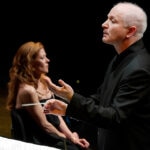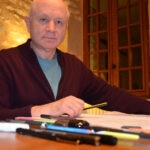The BBVA Foundation awards the Frontiers Prize to composer George Benjamin
Sir George Benjamin (composer, conductor and Henry Purcell Professor of Composition at King's College London) has been awarded the BBVA Foundation Frontiers of Knowledge Award in the category of Music and Opera for "his extraordinary contribution and impact in contemporary creation in the realms of symphonic music, opera and chamber music," according to the committee.

Benjamin's symphonic and chamber music has been performed by the world's leading orchestras and institutions. The committee's citation notes that the London composer "manages to communicate directly with the audience, without forgoing a rigorous, fine-grained workmanship in all aspects of composition, with particular regard to his mastery of orchestration and tone color, and exquisite formal architecture."
With his four operas – Into the Little Hill (2006), Written on Skin (2009-12), Lessons in Love and Violence (2015-17) and Picture a day like this (2023) – Benjamin has found his most unique voice, in the view of the committee, “modernizing the operatic language, proposing new structures and consistently presenting an emotional dramaturgy that both connects with and moves the public of the 21st century.”
Víctor García de Gomar, committee secretary and Artistic Director of Barcelona’s Gran Teatre del Liceu, stated: “We are probably talking about the most important name in contemporary music. And he is still a formidable creative force. Every new addition to his catalogue is eagerly awaited, especially in the world of opera: he writes a new one every four or five years, and with that rhythm of output and the quality of his work, expectations are always high.”

Sir George Benjamin (composer, conductor and Henry Purcell Professor of Composition at King's College London) - BBVA Foundation.
Music as a mirror of today's world
Asked about the subject matter of his operas, Benjamin believes the historical period they are set in is of secondary importance: “As for the fact that our works are usually set in quite ancient circumstances, but have strong contemporary references, that’s one of the many, many things I’ve had to learn while writing opera, to avoid settling for easy solutions or two dimensional portrayals. It’s something that has been part of my learning process,” the composer explained.
Music, theater and opera, with words and drama, can’t help but throw a mirror to our contemporary world. “And there’s a strange beauty to how opera can create a deep resonance to things that are right now important to our world. We face such big challenges at the moment, it’s almost terrifying. What can I or anyone else offer? I don’t feel worthy to even suggest a solution to anything. But music can speak to the heart of the people like nothing else can,” Benjamin added.
When composing, Benjamin aims “to write something that I want to hear myself, that matters to me and is the best that I can do, in the hope there might be some people out there who are also sensitive and open to it, and with whom it might resonate. It might stay with them and open up an area of thinking and feeling that is meaningful and new.”
A strong bond with Spain
In his work for chorus and orchestra Dream of the Song (2014-2015) Benjamin’s writing shows the influence of Spanish culture: “In that piece there’s not only text by Federico García Lorca – whose home I visited in Granada the first time and whose piano I played – there are also texts set to Hebrew poetry of the 11th century from Andalusia, a secular poetry of extraordinary modernity and beauty.”
Benjamin admits to feeling a deep connection to Spain. “I love the country and have been many times, to many different regions. My first professional experience was in Barcelona, where someone who has remained a dear friend and loyal supporter of my music, Josep Pons [the current musical director of the Gran Teatre del Liceu in Barcelona], invited me to conduct the Teatre Lliure Chamber Orchestra. He also invited me to conduct the City of Granada Orchestra, which gave me the thrill of seeing what is perhaps the most beautiful place in Europe, the Alhambra. I’ve been two or three times since and it remains for me an absolute jewel in the crown of our continent.”